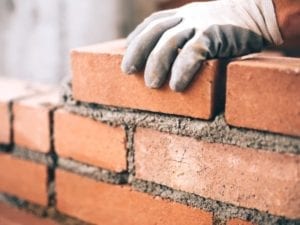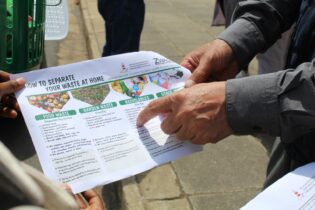Thirty-two-year-old Kedibone Tsiloane, is the founder of Ramtsilo Manufacturing and Construction – a proudly South African, 100% black female owned sustainable manufacturing and construction company.
Ramtsilo’s mission is to do everything possible to provide innovative and sustainable solutions to the global plastic pollution pandemic. The company has created a circular green economy in the plastic recycling and building material industry. They provide waste management and recycling services for plastic waste pollution, which is used in the manufacturing of strong, durable and fire retardant bricks. Their plastic bricks have created direct and indirect employment for a number of young and old individuals throughout their operations, in both the recycling and the construction industries. Tsiloane entered Ramtsilo into Nesta’s Afri-Plastic’s Challenge, a prize funded by the Canadian government and exists as an element of the Marine Litter Mitigation Fund. The Prize aims to reduce marine plastics in Sub-Saharan African countries by developing and scaling innovative solutions to plastic mismanagement in a way that promotes gender equality and empowerment of women and girls. This prize is designed to help promote gender equality and tackle some of the barriers women currently face in the sector. It involves a public competition that will reward the best solutions to addressing marine plastic litter in developing countries in a manner that promotes gender equality and empowerment of women and girls. The prize will help communities throughout Sub-Saharan Africa to prevent plastic waste from entering the marine environment by finding ways to minimise reliance on plastic, new ways of managing plastic waste, and/or new uses for plastic that has been discarded. Tsiloane shares that she was inspired to begin Ramtsilo as a result of growing up in a construction household, where her dad frequently took her on site.Ramtsilo started in 2013 as a construction business, however, owing to the fact that they had been spending so much money on building materials, specifically bricks, they made the decision to manually manufacture their own bricks at home.
“We are from the township and upon discussion with one of the waste collectors we learnt that plastic waste collection in conjunction with the recycling of plastic has created a source of revenue for the unemployed. We began prototyping the use of plastic in brick making since 2016 and in 2017 we had a product that we were comfortable with, which we took for testing. The results were much better than we expected and we formally went into the market in 2019.” When asked what motivates her as an innovator and drives her innovations, Tsiloane shared, “Wanting to make a lasting difference, creating lasting solutions to everyday problems.” Being a firm believer in good old persistence, Tsiloane says what separates her from other innovators is that she always sees things through, no matter how difficult things get. With sustainability being at the forefront of the Afri- Plastics Challenge, Kedibone shared the importance of sustainability to her, “It should be a subject at school, without us thinking in a sustainable manner there will be no ‘future’ for us or the next generation.” Looking to her future, Tsiloane shares that she aspires to create more innovative solutions that change how we live our lives on a daily basis. She further goes on to share her hopes for the manufacturing and construction industry, “I hope the industry will be more receptive to change and innovation. Whilst the traditional ways have worked, we need to get to a point where the industry is open to new ways of doing things.” As a woman working in a largely male dominated industry, she credits her parents for instilling values in her that have allowed her to navigate this somewhat intimidating environment, “One thing my parents made sure we knew growing up is that there isn’t a man’s role and a woman’s role. So when we encounter challenges on the basis of gender, we face them head on and we remind ourselves that we are not here by chance. We put in the work thus we have created a space for ourselves in this industry through hard work and persistence.” Tsiloane further urges other young women who dream of entering this industry to be bold in pursuit of your dream. Tsiloane’s role models include: Michelle Obama, Oprah Winfrey, Basetsana Khumalo and Sibu Mabena to name a few but she says that pretty much any other woman who wakes up everyday to fulfil her dreams in areas where women aren’t traditionally expected to excel is someone that she considers to be a role model.






